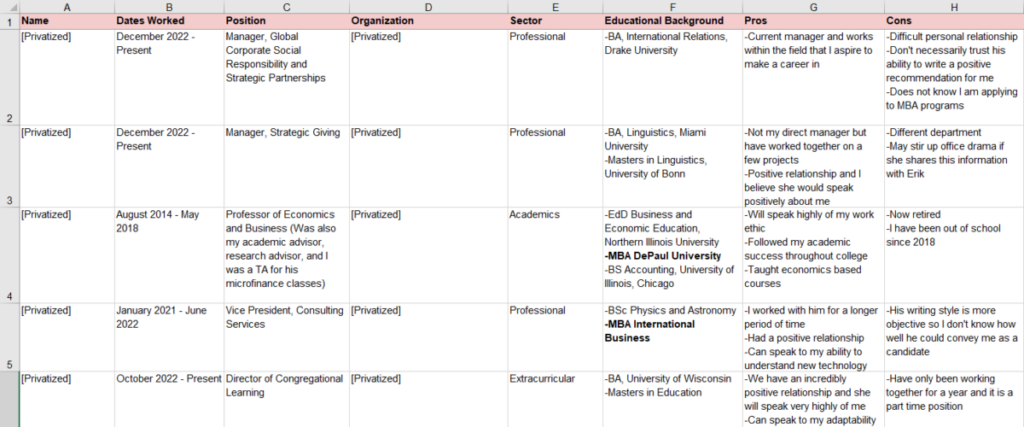Events & Promotions
|
|

GMAT Club Daily Prep
Thank you for using the timer - this advanced tool can estimate your performance and suggest more practice questions. We have subscribed you to Daily Prep Questions via email.
Customized
for You
Track
Your Progress
Practice
Pays
Not interested in getting valuable practice questions and articles delivered to your email? No problem, unsubscribe here.
- Nov 20
07:30 AM PST
-08:30 AM PST
Learn what truly sets the UC Riverside MBA apart and how it helps in your professional growth - Nov 20
10:00 AM EST
-10:30 AM EST
If you’re applying to Columbia, NYU Stern, or Yale SOM, you need more than strong stats. Each school defines “leadership” differently, and your essays must reflect that. Join Sia Admissions founder, Susan Berishaj on November 20th - Nov 12
01:00 PM EST
-11:59 PM EST
Get expert MBA strategy, instant essay feedback, and personalized advice on your entire application. Join My Admit Coach, the AI-powered MBA admissions platform built on 10K+ successful application docs for HBS, Stanford GSB, MIT and other top programs. - Nov 19
09:00 AM PST
-10:00 AM PST
What’s in it for you- Live Profile Evaluation Chat Session with Jenifer Turtschnow, CEO ARINGO. Come with your details prepared and ARINGO will share insights! Pre-MBA Role/Industry, YOE, Exam Score, C/GPA, ECs Post-MBA Role/ Industry & School List. - Nov 19
10:00 AM EST
-01:00 PM EST
Get expert MBA strategy, instant essay feedback, and personalized advice on your entire application. Join My Admit Coach, the AI-powered MBA admissions platform built on 10K+ successful application docs for HBS, Stanford GSB, MIT and other top programs. - Nov 19
11:00 AM PST
-12:00 PM PST
Round 2 is here — and it’s your chance to make your MBA dream happen! Join GMAT Club’s LIVE discussion with two top experts from The Red Pen, Gunjan Jhunjhunwala and Natasha Mankikar, as we break down everything you need to know - Nov 20
09:00 PM IST
-10:00 PM IST
Join our free expert-led Essay Workshops to discover how to choose impactful stories, highlight your core values, and align your background with each school’s distinct culture, making every word truly count. - Nov 21
08:30 AM EST
-09:15 AM EST
Get the inside scoop on what makes Emory’s Goizueta Business School great, learn how you can present a strong MBA application, and connect with an Admissions Director to get your questions answered. - Nov 21
09:30 PM IST
-10:30 PM IST
Learn how to craft powerful, authentic essays by mastering the 3 “WHYs” every top MBA program looks for: Why MBA, Why Now, and Why This School. - Nov 24
08:00 PM PST
-09:00 PM PST
Inquire for a free profile evaluation and guarantee statement for possible admits and scholarships!
Kudos
Bookmarks
| FROM Vantage Point MBA Admissions Blog: How to Choose an MBA Program |
 If you are fortunate enough to have finished round 1 with acceptances from multiple MBA programs in hand, congratulations! While you may have entered the application process with a mental ranking of your target programs, it’s often not that simple when it comes to making the final decision. Maybe you were waitlisted at your top choice program or have a compelling scholarship offer to consider. There can be a lot of variables at play. So, how do you choose an MBA program when it comes time to pay your deposit? Deciding where to enroll, which often means uprooting your life and moving to a new city, is of course an extremely personal decision. That said, in our experience, there are several best practices to ensure you make the most informed decision possible. Attend Admitted Students’ Weekends (With an Open Mind) Unless you have totally struck a school from your list, make your best effort to attend each admitted students’ weekend. There truly is no better way to immerse yourself in the school’s location and culture to see if you can envision yourself being there in the fall. Oftentimes you can even tour housing options and really think through the logistics of going to school in a particular place. Additionally, you’ll have the opportunity to speak with a broad swath of current students while you’re there, lessening the chance that your view of a school will be swayed by a small sample set of opinions. And, on this point, feel free to ask these students the tough questions – you’ve already been accepted, and they’ve been in your shoes so they get that choosing an MBA program is a big deal. Beyond the actual conversations you have with students, professors, and other prospectives, be a keen observer of the intangibles. Is the class discussion lively and engaging? Are students happily socializing in the halls or common areas? Above all else, while on campus, do your best to keep an open mind and approach the weekend as if you truly may enroll, even if you are leaning in another direction. Especially if you haven’t attended the admitted students’ weekend for your ‘top contender’ yet, you never know, and it may turn out to not be as compelling as you expect. In other words, make sure you walk away feeling like you’ve truly vetted each school. One quick pro tip on this topic – if a deposit deadline for one school occurs before another school’s admitted students’ weekend, it never hurts to ask for an extension. Worst case they say no, best case you can fairly assess your options. With that Said, Play the Long Game While much of the above advice centers on the experience you will have while at school, and that of course matters, remind yourself that you are going to business school to maximize your career prospects. When weighing the pros and cons of each program, give priority to criteria that will impact your life 5-10+ years from now over those that will define your experience for the next two years. Notably, really dig into each school’s employment statistics and ask probing questions about the recruiting prospects for your target industry in your target location. Instead of relying on published statistics, reach out to students pursuing your same field (you can often find names and emails on club websites), particularly second years who have been through internship recruiting and have a sense for internship to full time conversion ratios. While this may change, the current job market is tough and where you land upon graduation is important for your overall career trajectory. Another component of playing the long game relates to scholarship offers. And we’ll heavily caveat our advice by acknowledging that everyone’s financial situation is different so the following may or may not apply to you. But keep in mind that while scholarships certainly help defray the cost to attend business school and potentially the debt burden you will have after graduation, an extra $40,000 might not be all that material in the grand scheme of your working life. Especially if you are targeting a lucrative career path and a school that hasn’t offered you a scholarship will increase your chances of success in recruiting for that path. In other words, while you should certainly consider (and try to negotiate) scholarship offers, they might not be the end all be all when you ultimately choose an MBA program. Ultimately, it’s Ok to Use Intuition and Not Look Back If you’re like many business school applicants, it can feel like you should choose an MBA program based on a data-driven, weighted analysis of pros and cons. In case you need to hear this, it is absolutely ok to choose an MBA program based on intuition! This is a highly personal, multifaceted decision and you can’t rely on logic alone to make it. Further, research actually supports this approach: ‘Intuition is often seen as the opposite of reason. And when we cast things in this binary way, we often define intuition as a yardstick that has no place in the age of science and data. But recent research from Laura Huang, an associate professor of business administration at Harvard Business School, reveals that gut feelings can in fact be useful, especially in highly uncertain circumstances where further data gathering won’t sway the decision maker one way or the other.’ There is a reason most MBA alums look back positively on their experience in business school – while there are differences between programs, the top ones are generally great, and you will find your people at any of them. So, make your decision and don’t look back – look forward to the awesome experiences that await you. Congratulations again. The post How to Choose an MBA Program appeared first on Vantage Point MBA. |
This Blog post was imported into the forum automatically. We hope you found it helpful. Please use the Kudos button if you did, or please PM/DM me if you found it disruptive and I will take care of it.
-BB
Kudos
Bookmarks
| FROM Vantage Point MBA Admissions Blog: Understanding the MBA Application Process: Five Things You Can Be Doing Right Now |
 Yes, it’s only January and it may seem like you have plenty of time before the first round of MBA application deadlines. However, there are several crucial things you can be doing right now to give yourself a leg up on the MBA application process (and reduce your stress level in the fall). Our overarching recommendation is that you look at the list below and lay out a month-by-month timeline for the year, assuming everything will take longer than you think. Best case, they don’t and you’re ahead of the game; worst case, they do and you’re still on track. 1) Schedule Your Class Visits for this Spring People are often surprised – not in a good way – that there really isn’t much time to visit schools in the fall before round 1 application deadlines. And you really want to go while classes are in session (i.e., not over the summer). If you plan to apply round 1, which you should if you’re already thinking about the MBA application process, schedule your visits in the spring. Not only does this help ensure you’ll get them in, it also allows you to interact with students while they’re not in the throes of recruiting and highly stressed (plus both first and second years will be able to share insights into their recent recruiting experiences). School visits help you assess which schools may be the best fit for you and provide valuable essay and interview ammunition such as the specifics of clubs, classes and the school’s culture that are challenging to conceptualize from merely reading the website. Those who visit almost always write better essays than those who don’t, in our experience. 2) Take the GMAT or GRE ASAP (Seriously – Just Schedule the Exam and Don’t Look Back) Knowing your GMAT or GRE score early in the MBA application process is helpful in a number of ways. While a test score is far from the only data point schools consider, it should be a factor as you hone your list of target schools and begin researching them. Further, if your score isn’t what you hoped it would be, knowing this early on will provide time to take extra classes in advance of applying, providing an important counterpoint for schools to consider. Or, you might attempt a retake or even switch tests if you’ve hit a roadblock on the one you initially attempted. Last but not least, by taking that burden off your plate, you can focus on the higher-level, strategic aspects of the MBA application process such as defining your story and goals. Request an Initial Consultation 3) Get Those Coffee Chats on the Calendar An MBA is more than an academic degree. It’s a holistic experience with many aspects that are hard to understand without having been there yourself. Seek out people in your network who can talk to you about their MBA experiences. Not only will having these conversations early help you collect information to accelerate your process, it could also lead to stronger advocacy for you by these individuals if they write your recommendations later on. Everyone likes to see someone being proactive! 4) Be Honest About Your Weaknesses…So You Have Time to Do Something About Them It’s not hard to find information on what the schools are looking for. Think through where your areas of weakness are and create an action plan to address those issues over the coming months. Typical areas of weakness include low undergrad GPA, low GMAT / GRE score, limited extracurricular involvement, limited leadership experience, etc. Though you can’t change the past, you can always mitigate the potential negative impact of anything that’s less than perfect on your profile. 5) Start Thinking About Your Goals ASAP Being able to articulate why the MBA is the right degree for you and what you plan to do with it is extremely important. There are limited spaces in each top MBA program, so they want people who they know will leverage the MBA to do great things. For 75% of people we work with, defining their goals is one of the hardest parts of the process. It takes time, conversations, research and sometimes more than a little soul searching. We encourage you to start this process early. As a tip, we have most of our clients begin by looking at the job placement reports for their target schools and looking at the LinkedIn profiles of people whose careers may interest them (co-workers, family friends, etc.). Then we get much more methodical, but this preliminary research helps you to get a sense for the lay of the land. If you want help creating a personalized timeline in advance of your MBA application process, reach out to request an initial consultation. The post Understanding the MBA Application Process: Five Things You Can Be Doing Right Now appeared first on Vantage Point MBA. |
This Blog post was imported into the forum automatically. We hope you found it helpful. Please use the Kudos button if you did, or please PM/DM me if you found it disruptive and I will take care of it.
-BB
Kudos
Bookmarks
| FROM Vantage Point MBA Admissions Blog: The Top 3 Pitfalls to Avoid in Your Business School Interview |
 With Round 2 MBA deadlines in the rearview mirror, many of our clients are (smartly!) turning their focus to preparing for business school interviews. We love mock interviewing with them in the lead up to the real thing. Additionally, many on our team previously served as admissions interviewers. Through these experiences, we’ve noticed some common pitfalls to which even the most impressive candidates can fall victim. Here are our top 3 business school interview pitfalls and how to avoid them: MBA Interview Pitfall #1: Jumbling the chronology of your resume walk through. The opening question in many business school interviews is ‘walk me through your resume’ or ‘tell me about yourself’. First, recognize that these are essentially the same question. The interviewer wants you to share your background, primarily focused on college and thereafter. They want to hear about your career progression and accomplishments, but they also want to understand the ‘why’ behind each of your choices (college major, job changes, etc.). In our experience, when asked to walk through their resume, many candidates begin with their current role (i.e., the top of their resume) and work their way backwards (i.e., down the page). This can get very confusing and come out awkwardly. We find that it’s way more coherent to begin with college and talk through your experiences chronologically, through to present day. Further, this ordering more naturally leads into the likely follow-on discussion of why you are choosing to pursue an MBA. For each ‘section’ of your resume – college is one ‘section’, as is each job you’ve held – talk about three things: the ‘what’, the ‘why’ and the ‘how’. The ‘what’ refers to a high-level description of your company, function, and role. For college, briefly cover where you went and your major/minor(s). The ‘why’ refers to the rationale behind your decision to pursue that opportunity. As it relates to college, this may entail why you chose your school and/or major. The ‘how’ refers to adding in a top or key accomplishment that highlights your impact or “brings to life” what your group does. An example could sound like this: “I joined ABC Consulting in their healthcare practice where I focused specifically on operations improvement projects. A defining moment for me was when I partnered with an RN to develop a new process for X hospital to materially reduce the risk of sepsis, a possibly deadly infection. This project gave me a taste of the deep impact I could have through a career in healthcare, but it also made me curious about other questions such as XYZ. So that’s why I took my next role at ABC company, to explore the issue of access…” After working your way through your current role, it can be a nice touch to wrap up with a brief mention of your involvements or interests outside of work. This demonstrates that you are engaged in your community. It can also serve as a potential connection point between you and your interviewer, if you happen to share a hobby or interest. looking for personalized MBA application guidance? Request an initial consultation MBA Interview Pitfall #2: Diving into ‘why MBA’ without sharing your career goals. In addition to sharing your background, the other key thing your interviewer is looking for you to communicate is why you want to pursue an MBA and why their school is at the top of your list. When asked, ‘Why do you want to attend X school?’, we find that clients often get a bit flustered and dive right into the characteristics (classes, clubs, etc.) of that program that are appealing. This isn’t inherently bad, it’s just hard for the interviewer to interpret why certain things are appealing to you if you haven’t shared the context of your post-MBA career plans first. In our experience, a better approach is to begin by sharing what you plan to do after graduation (immediately and a little further down the road) and then talk about how the program in question will set you up for success in your target career. It may feel a bit like you are dodging their question at first and that’s ok, so long as the bulk of your answer is spent impressing them with your knowledge of the program and specific insights as to how it is a perfect fit for your needs. MBA Interview Pitfall #3: Telling stories that are too complex. A final pitfall we commonly see in business school interviews is responding to behavioral questions (‘tell me about a time when…’) with stories that require too much upfront context. In our experience, candidates are more apt to flub a complicated story or tell it in a way that is confusing to the interviewer. This makes it difficult for the interviewer to accurately recall what you told them when it comes time to submit their evaluation. Additionally, to be honest, people tend to zone out when they don’t follow what someone is talking about. More importantly, however, spending too much time sharing the upfront context of a story limits the amount of time you can spend on your actions, which are ultimately what you want to emphasize. Practice your stories out loud and focus on those where you can cover the ‘setup’ in ~30-45 seconds (max). You want to keep your answer to a behavioral question around two minutes, so this leaves plenty of time to cover your actions and the ‘result’ of the story. Did you know that we provide mock business school interview sessions accompanied by written feedback? We’d love to help you prepare. Reach out to learn more. Before your MBA interview, you may also be interested in reading: Exit Polls: Interview Reports for Stanford, Haas, Sloan, Columbia, Booth and Fuqua Prepare for These Three Questions Before Your MBA Interview The post The Top 3 Pitfalls to Avoid in Your Business School Interview appeared first on Vantage Point MBA. |
This Blog post was imported into the forum automatically. We hope you found it helpful. Please use the Kudos button if you did, or please PM/DM me if you found it disruptive and I will take care of it.
-BB























